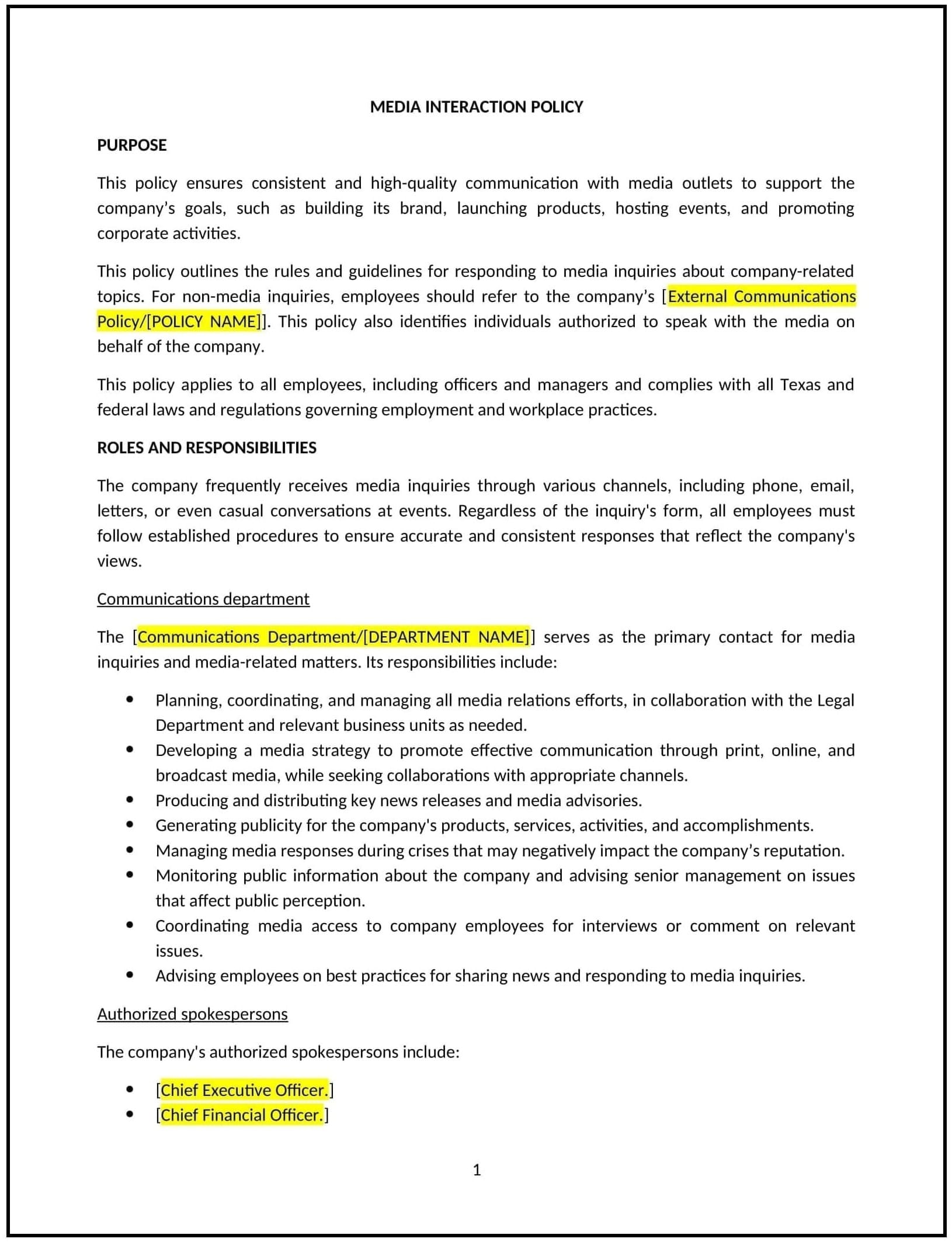Got contracts to review? While you're here for policies, let Cobrief make contract review effortless—start your free review now.

Customize this template for free
Media relations policy (Texas)
This media relations policy is designed to help Texas businesses establish clear guidelines for managing interactions with the media, including journalists, news outlets, and other media representatives. The policy provides a framework for controlling the company’s public image, ensuring consistent messaging, and maintaining positive relationships with the media while safeguarding sensitive information.
By adopting this policy, businesses can ensure that all external communications are aligned with the company’s values, avoid potential reputational risks, and ensure that the company speaks with one voice in public relations matters.
How to use this media relations policy (Texas)
- Define the scope of media relations: Specify the types of media contacts covered by the policy, including traditional news outlets, social media influencers, bloggers, and other public-facing entities.
- Designate official spokespersons: Identify the individuals authorized to speak on behalf of the company, such as the CEO, PR department, or other designated spokespersons. Specify who should handle media inquiries and how communications should be routed to the right individual.
- Set guidelines for responding to inquiries: Outline the steps employees should take when approached by the media, including how to respond to questions, when to refer inquiries to the designated spokesperson, and the importance of maintaining confidentiality and professionalism.
- Establish communication protocols: Ensure that all external communications align with the company’s messaging and values. The policy should set expectations for how to handle positive or negative media coverage, ensuring that responses are consistent, accurate, and appropriate.
- Address social media and public comments: Specify how employees should engage with the media on social media platforms and public forums. This includes guidelines for commenting on or sharing media stories, as well as how to handle inquiries or comments on company social media accounts.
- Protect sensitive information: Provide clear instructions on how employees should handle sensitive or confidential information when speaking with the media, and outline the consequences of unauthorized disclosures.
- Set expectations for crisis communication: Define the steps for responding to a crisis situation involving the media, including how to manage negative publicity, avoid misinformation, and ensure that the company’s response is well-coordinated and timely.
Benefits of using this media relations policy (Texas)
This policy offers several benefits for Texas businesses:
- Protects the company’s reputation: By setting clear guidelines for media interactions, businesses can prevent potential public relations issues, mitigate risks, and safeguard the company’s public image.
- Ensures consistent messaging: The policy ensures that all media communications are aligned with the company’s messaging, values, and strategic goals, avoiding mixed messages or inconsistencies.
- Improves media relationships: By establishing formal protocols for interacting with the media, businesses can foster positive relationships with journalists, reporters, and influencers, leading to better coverage and more favorable media attention.
- Reduces legal and compliance risks: A structured approach to media relations helps prevent the release of sensitive or confidential information that could lead to legal issues or regulatory violations.
- Enhances crisis management: Having a clear media relations policy in place allows businesses to respond quickly and effectively during crisis situations, minimizing the impact of negative publicity.
Tips for using this media relations policy (Texas)
- Communicate the policy clearly: Ensure all employees, particularly those in PR, communications, and executive roles, are aware of the policy and understand how to engage with the media.
- Train employees regularly: Offer ongoing media training to help employees understand how to manage media inquiries, handle difficult questions, and maintain professionalism in interviews.
- Designate a spokesperson: Identify key spokespeople for your company, ensuring they are well-prepared to communicate on behalf of the business and represent its interests effectively.
- Monitor media coverage: Regularly monitor the media for coverage of the company, industry trends, and competitor activities. This will help you stay informed and better prepared to respond to inquiries.
- Review regularly: Periodically review and update the policy to reflect changes in media dynamics, business needs, or Texas state laws.